Should Your Kids Send Thank You Notes?: The Joy/Job of Gratitude
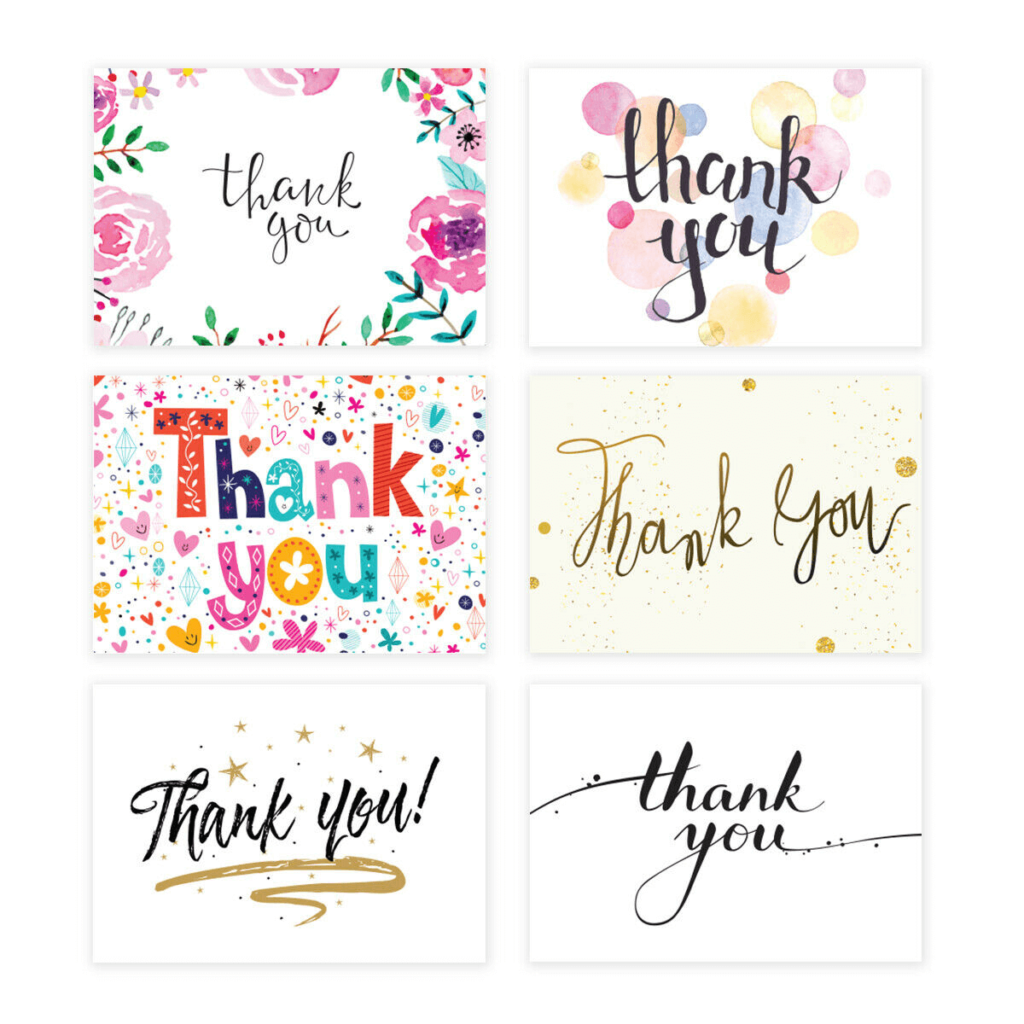
My mom raised me and all three of my siblings to send thank you notes.
Promptly. For everything. To everyone. Just like her mom before her.
I value the tradition of gratitude underlying that, and to this day, I still (try to) send thank you notes most of the time. But I also harbor mixed feelings about them — generally — which have only expanded since I became a mom.
The truth is — with my two kids’ birthdays in December plus the holidays, the amount of stuff in our home seems to multiply by approximately 18.4 times every New Year’s. And apart from being preoccupied with the task of organizing (and constantly cleaning up) all the gifts my children receive from our generous and well-meaning family members, I always get tripped up by the question of how to handle thank you notes. How do (and should) I “do” them? And what about my kids, who (at 2 and 4) are still too young to write? Should I bother to involve them in the process?
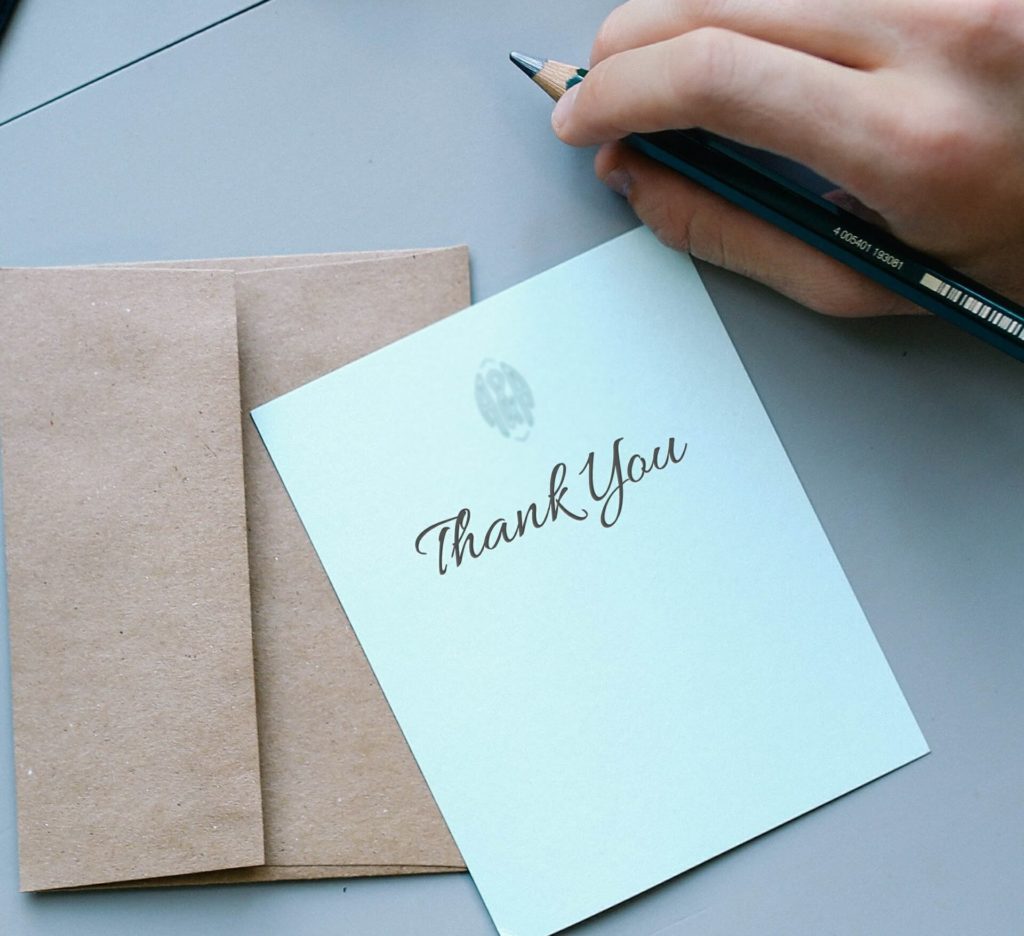
I actually find the culture surrounding thank you notes to be a fascinating topic of discussion. It is comically divisive — I’ve learned that over the years. People often have really strong feelings about them, ranging from “hell no!” to “100% absolutely!”… and everything in between.
I used to think that differences in opinion were more generational than anything else, but I think it runs deeper than that: it’s also about your family, how you were brought up, where you live now, what kind of culture you’re steeped in — in short, it’s personal.
And personally, I’m conflicted.
On the one hand, I’m deeply committed to teaching my kids gratitude, and I respect the tradition of sending thank yous. But I’m also — cringing as I type this — a millennial (sigh) and a pragmatist without much patience for adhering to “proper etiquette” just for the sake of it. (And as my husband says: “If you give a gift and you expect a thank-you note, that’s not really a gift. It’s a transaction.”)

Teaching Gratitude
By the way, teaching gratitude to our children is really important. Obviously.
It’s also good for us. Research indicates that people with higher levels of gratitude have lower levels of anxiety and depression as well as higher levels of overall well-being, self-esteem, optimism, and empathy. One study even suggests that gratitude may be associated with 25% higher happiness levels.
In short: gratitude is healthy.
But it doesn’t always come easily, which is why it’s really important to help educate young children about how to be grateful, and show gratefulness.
I hear a lot about how a thank you note can brighten up someone’s day, but — honest truth here — I’ve never cared one bit about a thank you card I’ve received. Ever. (No, I’m not the Grinch or Scrooge or the heartless Tin Man — I just don’t think it’s important to have a 3-5 sentence written record recognizing a gift I’ve given… or worse, a dinner I hosted at my house.)
And as a busy (and cynical) working mom, I’m prone to seeing thank you notes as just another thing I’m going to wind up nagging my kids about. Or else just doing myself (sigh).
Thank You Notes: One Size Does Not Fit All
In trying to figure all of this out for myself, I asked you, lovely readers, what your stances on thank you notes were.
Again, people are highly divided (even among our own staff). Overall, we were surprised how split the results were: 54% of you said you DON’T do them, and 46% said you DO.
In general, we had a lot of dismayed “is-it-really-that-hard-to-take-two-minutes-to-send-a-note-of-gratitude?” kinds of responses mixed with “I’d rather have a root canal.” Some parents think writing a thank you card is “a life skill,” while others see it as dated.
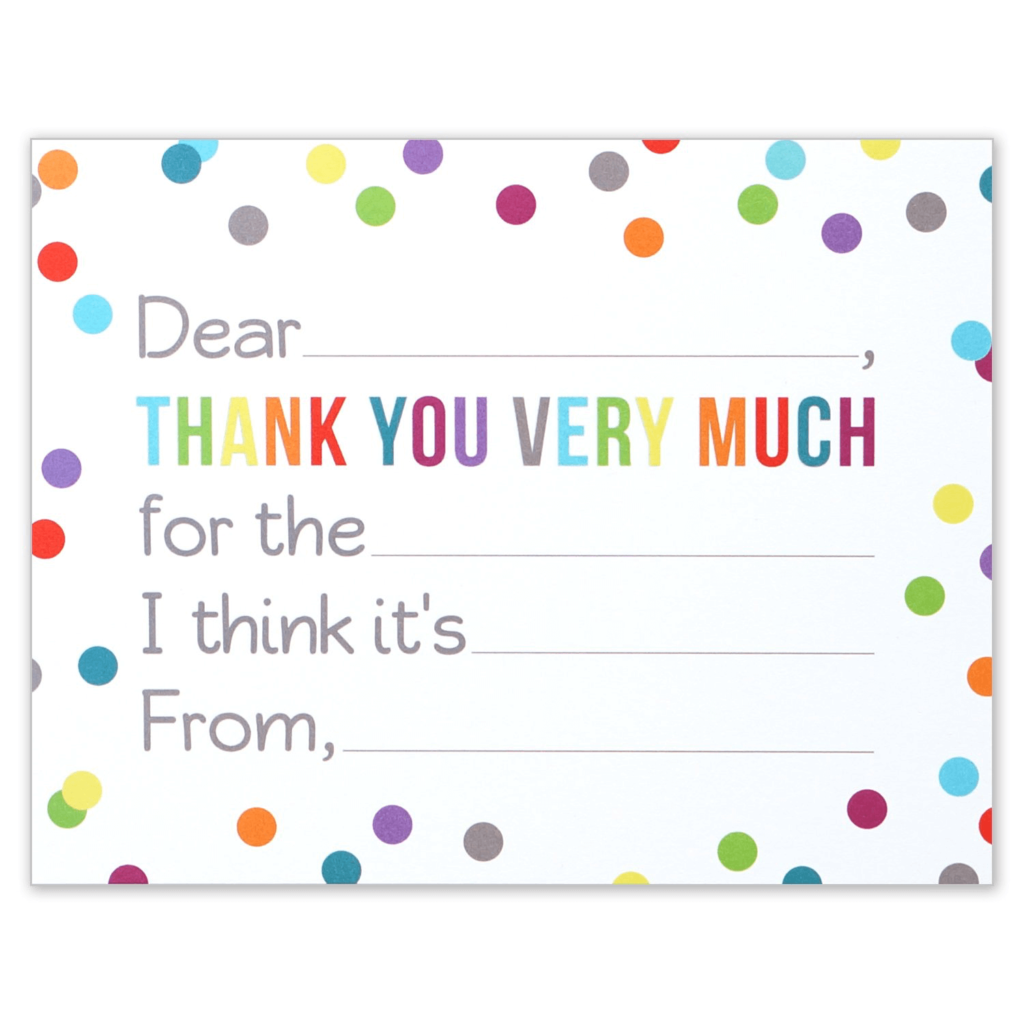
Some people are totally cool with generic fill-in-the-blank cards sent en masse, while others see those as impersonal and detached. For some, the act itself is easy-peasy (just give a kid a marker and a sheet of paper — it’s practically effortless!), while for others it is a real nuisance (seriously? Don’t I have enough on my plate? When I am supposed to make time for that?). Some of you saw acknowledgement as the supreme issue (regardless of form), while others saw the traditional hand-written thank you card as the only viable solution.
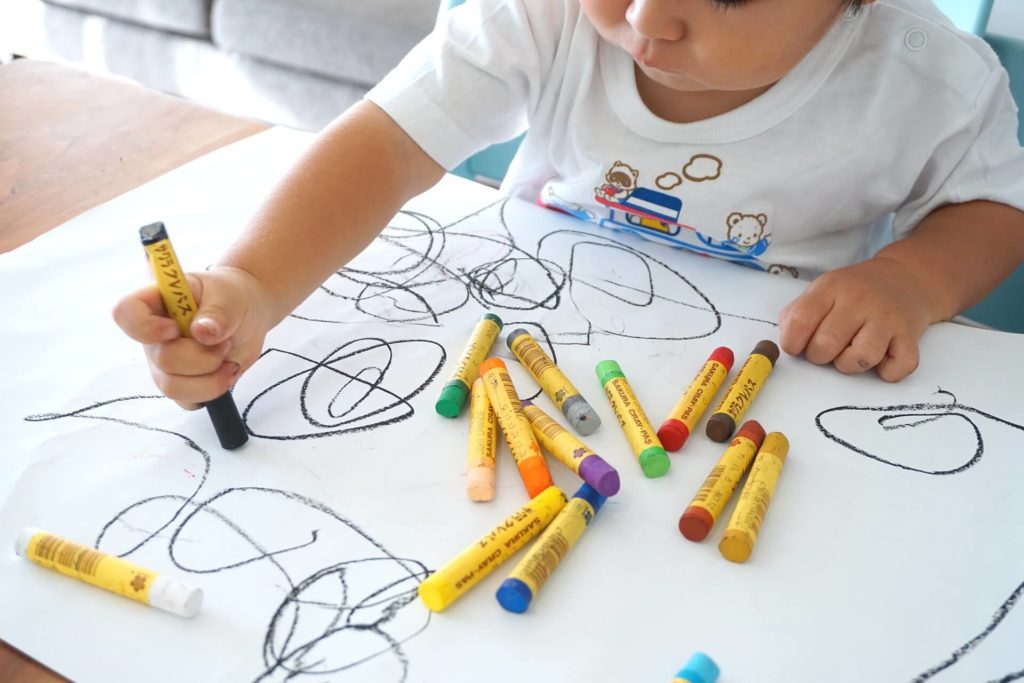
And many, many of you clarified that when you talk about your family doing thank you cards, it’s really YOU doing them. Mom.
As one reader put it: “when I say ‘we’ do thank you cards, I really mean ‘me.’”
I totally get both sides of the argument. Seriously. I do. And I’m still not sure where it leaves me.
Personally, I think there’s something incredibly appealing about author Gretchen Rubin’s stance on the whole thing, which is simply that her kids don’t have to write thank you cards (or rather, that she doesn’t force her children to “do them”). How liberating!
And yet I know this approach would disappoint my immediate family.
Plus, at the end of the day, we think it boils down to this: gift-givers want to know that their gift was (a) actually received (and not lost in the mail) and (b) appreciated…. The good news is, there’s more than one way to skin this cat.
If you, too, are on the fence on the topic, here are some practical strategies proposed by our readers:
- Only write thank you notes for specific groups (for some, this was family only — but others did the opposite and only sent cards to non-family-members). (Some make a “deal” with their close family members to skip the whole exercise altogether.);
- Only write thank you notes for certain occasions or kinds of gifts;
- (some people did “en masse” fill-in-the-blank cards, others saw this as pointless and robotic)
- Only send thank you notes when you aren’t able to say thank you in person;
- Send thank you video clips or Facetime with the giver;
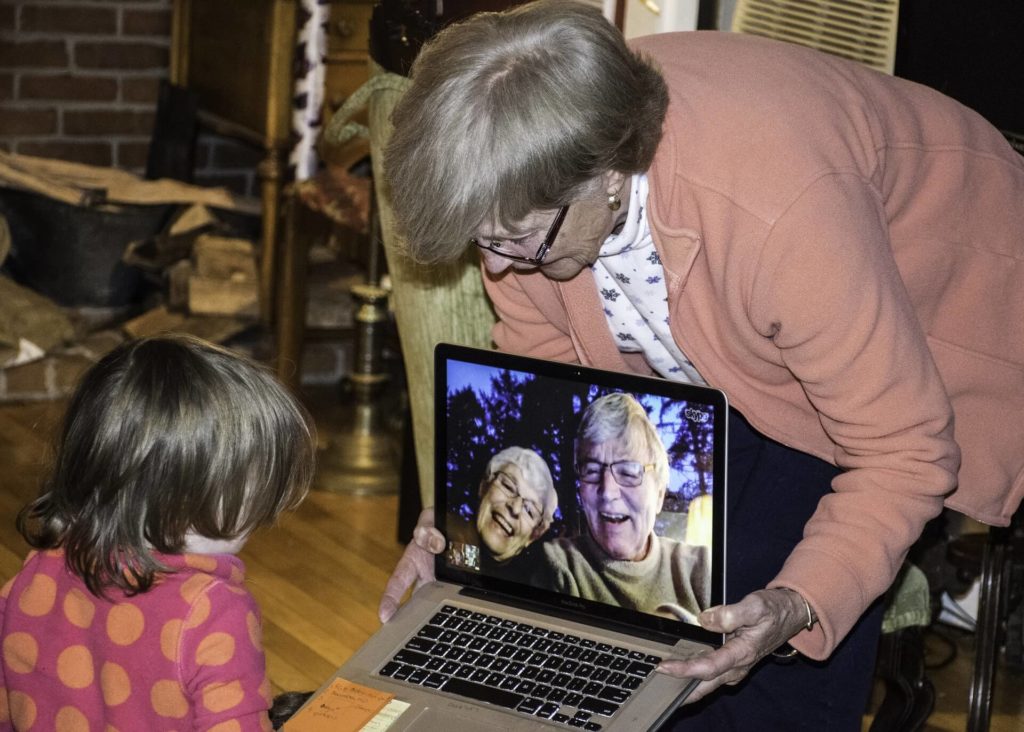
- Send a photo of the gift being opened or enjoyed with a brief text message;
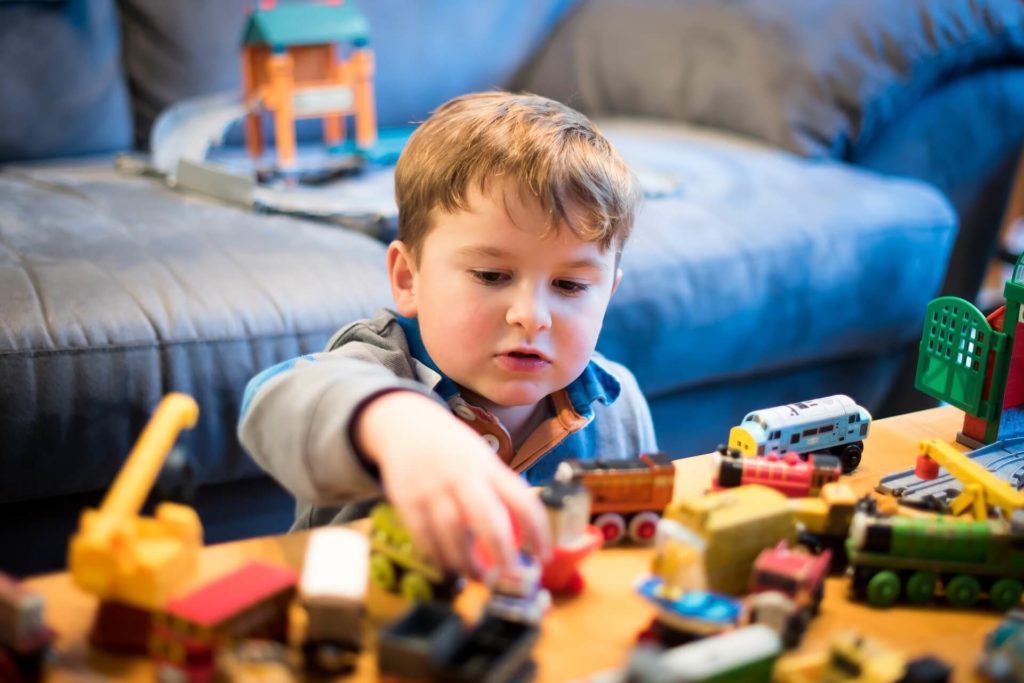
- Send thanks in the same way a gift came — if it was received in the mail, send back a thank you card; if it was received in person, say thank you in person; if you received a gift card via email, send a thank you email response;
- Have your toddler/illiterate child scribble or color (and/or dictate a brief message of thanks that you write down) and then gradually transition to having her write her own own note or card later on.
- (Time-saving, sort of cheating, tip: keep a folder full of toddler drawings/scribbles that you can pull from whenever you need to send a thank you note.);
- Tell your kids they cannot cash their birthday checks/enjoy the gift until a thank you note is written and mailed (!!!).
More Ways to Help Teach Gratitude
Thank yous can play a role in the parental mission to instill gratitude, but they don’t implicitly teach “grateful thinking.” In other words, writing (or saying) “thank you” isn’t necessarily an act of gratitude. For many children (and adults), it’s a rather mindless chore.
Nonetheless, teaching young children to say thanks is important, even if they don’t “think gratefully” in doing so. To wit: we make our children say “please” long before they understand what it means because we know that building habits can help cultivate more abstract understanding down the road.
Personally, some of the “alternative” strategies psychologists recommend for teaching gratitude to children resonate much more strongly with me than writing and sending thank you cards:
- Pose questions that encourage “gratitude thinking,” such as:
- Why do you think you got this?
- How do you feel receiving this?
- What were you grateful for today?
- Prompt children about “paying it forward”:
- What could you do to make someone else happy?
- How can we share this?
- Read books and stories about gratitude (such as The Thankful Book, Thankful, or Bear Says Thanks)
- **Model gratitude: showing appreciation and demonstrating the kind of gratefulness we want to teach our children — on a daily basis, really living it — is perhaps the most important strategy for teaching gratitude. For example:
- SAY “thank you” or “I appreciate _____” (be polite!)
- Offer help (i.e.: hold the door open, help carry something for someone, help your children with ____)
- Reflect on what you appreciated at the end of each day and share it with your kids
- Give compliments
For now, my household is sending out our many, many birthday and holiday thanks via a hodge-podge of phone and Facetime calls, pictures and video clips sent via texts, and true-to-form thank-you cards (always written by me, sometimes with a crayoned toddler masterpiece thrown inside the card).
Here’s to finding more resolution through all this^.
Sending Thank you cards are actually traditional and a lot of things are changing.
I send text messages to show gratitude and I’m currently teaching my kids to say thanks.
Thank-you for your input…I agree.
May I recommend The Book of Courtesy..written by Sister Mercedes in the early 1900s and then rewritten later on to adapt to modern times.
I enjoy this publication and hope you will too.
This is great! I have found myself using all the practical strategies you listed. We generally will do a text message and a few pics of my toddler opening the gift and playing with the gift since I can do it immediately and it will never end up on my to-do list. For my grandparents that are out of state I do a phone call twice a year, after my birthday and after Christmas. Then we also catch up and chat for a couple hours. Once my son is old enough I may have him start writing cards for the mailed gifts only but as a general rule, if you can say thank you in person you don’t need to write thank you as well.
I hate thank you notes, and I agree with your husband. It turns a gift into a transaction. I am all for showing gratitude, and will sincerely thank anyone for just about anything.
But what bothers me is that never in my life have I received a thank you note from a man. They are ALWAYS from the mom or the wife. I made my husband write (a couple of) the thank you notes when we got married, but I am the only one who writes them for gifts for our toddler. It seems like one more piece of mental and emotional labor for women to take on, and my life is already busy!
Cady – we couldn’t agree more!! Thanks for the comment!
Wow! This article moved me to tears. I am not one to expect gratitude from someone when you extend a nice gesture to me but I definitely know that gratitude paves way for more blessings. I will definitely teach my kids same when they start coming.
I loved how you have inculcated this value of gratitude in your kids via Thank You notes. I have been trying to teach my kid the value of thank you by asking him to write three things everyday that he is thankful for. But I think I need to add this dimension about saying thank you to the relevant person too.
Nice article. Been grateful is something everyone should learn. It is a habit that should be pass on to the kids. So when my kid sends a thank you note, it gladdens my heart.
Like you mention, I wish we could remove thank you notes from their tie with consumerism. I send thank you texts (and sometimes cards, depending on the recipient) for gifts I actually am grateful for, like someone helping around the house or sending me something they knew I needed. I’m not grateful for junk. Therefore, I never know what to do when it’s something given thoughtlessly and out of obligation that went straight from the package into the “donate” bin. What do you do when you sincerely want people to just stop?
Thank you notes or at the very least a phone call or text. People register for every thing they want these days. Yet, after they recieve a gift, no response! It is as if it is expected! People spend their hard earned money and take the time to shop. Get off your cell phones and do be grateful that people think enough of you or family member to go the extra mile and expense, I bet you would sure hear from one of them if they received ZERO for a birthday or baby gift.
My daughter(s) say if you give my children a gift and want a thank you, don’t bother. They have not taught their kids to acknowledge gifts of any kind.
Gratitude is a learned behavior. I am so grateful that my parents taught me gratitude and proper etiquette. I am 55 by the way and I taught my son to send acknowledgement cards as well. At the end of the day, no one is any busier today than they were 30 years ago. I believe showing gratefulness is a life skill and should be taught in school. Call it old fashioned if you will. Please teach your children gratefulness – our future depends on it.